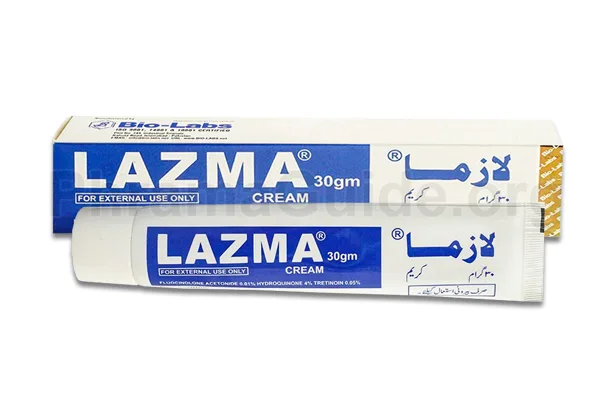Lazma cream is a combination medication used to treat moderate to severe melasma, a condition that causes dark patches on the face. Melasma is most common in women, and it is often triggered by hormonal changes, such as pregnancy or taking birth control pills.
About Lazma Cream
- Generic Name: Hydroquinone + Tretinoin + Fluocinolone
- Properties: Antioxidant + Antineoplastic + Anti-inflammatory
- Manufactured and Marketed By: Bio Labs
- Presentation: 10gm Tube (Cream form)

Common Uses and Indications of Lazma Cream
- Melasma: Lazma cream is commonly used to treat melasma. It is a common skin condition that causes brown or grayish-brown patches on the face. It is more common in women, especially those with darker skin.
- Post-Inflammatory Hyperpigmentation (PIH): PIH occurs as a result of inflammation or injury to the skin, such as acne, insect bites, or cuts. After the initial condition has healed, it can leave behind dark spots or discoloration. Lazma cream is used to reduce the appearance of these pigmented areas.
- Sun Damage: Lazma cream can be used to address skin damage caused by long-term sun exposure, including sunspots, age spots, and uneven skin tone.
- Acne Scarring: Tretinoin in Lazma cream can help improve the appearance of acne scars by promoting skin cell turnover and collagen production, leading to smoother and more even skin texture.
- Skin Lightening: In some cases, Lazma cream may be used for overall skin lightening or to address uneven skin tone in individuals with conditions like hyperpigmentation or dark spots.
- Inflammatory Skin Conditions: The use of Lazma cream can help reduce inflammation and redness associated with various skin conditions, such as eczema or dermatitis when used under the guidance of a healthcare professional.
Off-label Uses of Lazma Cream
- Acne Treatment: Lazma cream may be considered in some cases, especially when acne is associated with significant hyperpigmentation or post-inflammatory hyperpigmentation (PIH).
- Scar Reduction: The use of Lazma cream helps to promote collagen production and cell turnover and may be beneficial for improving the appearance of scars, including surgical scars or scars resulting from trauma or injury.
- Dark Circles under the Eyes: Some individuals may use Lazma cream to address dark circles or hyperpigmentation under the eyes, although caution should be exercised in this sensitive area.
- Stretch Marks: Lazma cream can be used off-label to improve the appearance of stretch marks, particularly if they are associated with hyperpigmentation.
- Skin Aging: Using Lazma cream can help address signs of skin aging, such as fine lines, wrinkles, and age spots, although this would typically be done under close medical supervision.
Formulation and Ingredients of Lazma Cream
- Fluocinolone Acetonide: 0.01%w/w
- Tretinoin: 0.05%w/w
- Hydroquinone: 4%w/w
Hydroquinone: Hydroquinone is a skin-lightening agent. It works by reducing the production of melanin in the skin, which can help to lighten dark spots, melasma (a type of hyperpigmentation often caused by hormonal changes), and certain types of skin discoloration. It’s commonly used to treat conditions like melasma, post-inflammatory hyperpigmentation, and age spots.
Tretinoin: Tretinoin is a form of vitamin A and is part of a class of medications known as retinoids. It is used topically to treat acne and to reduce the appearance of fine lines and wrinkles. Tretinoin works by increasing cell turnover in the skin and promoting the growth of new, healthier skin cells. It can improve skin texture and reduce the formation of comedones (whiteheads and blackheads).
Fluocinolone: Fluocinolone is a corticosteroid, and Lazma cream, is included to reduce skin inflammation and irritation. It can help alleviate the redness and itching associated with various skin conditions. In combination with hydroquinone and tretinoin, fluocinolone can help manage skin conditions that involve both hyperpigmentation and inflammation.
Proper Application of Lazma Cream
- Start with a clean face.
- Apply a thin layer of the cream to the affected areas.
- Gently massage it into the skin.
- Use sunscreen during the day as these ingredients can make your skin more sensitive to UV rays.
- Follow your dermatologist’s instructions for the best results.
Who Should Avoid Using This Cream? – Contraindications
While Lazma cream can be highly effective, it’s not suitable for everyone. Individuals with the following conditions should avoid using it:
- Allergies to any of the active ingredients.
- Open wounds or irritated skin.
- Pregnant or breastfeeding women (consult with a healthcare professional).
- Children under 12 years old.
FAQs
- Q: Is Lazma cream available over the counter?
No, this cream is typically available by prescription only. - Q: How long does Lazma cream use to see results?
Results vary from person to person, but noticeable improvements can often be seen within a few weeks of regular use. - Q: Can I use Lazma cream along with other skincare products?
It’s best to consult your dermatologist before combining Lazma cream with other products to avoid any adverse reactions. - Q: Are there any side effects to be aware of?
Possible side effects include redness, peeling, and increased sensitivity to sunlight. These can be managed with proper skin care and sun protection. - Q: Can I use Lazma cream on my body as well?
It’s primarily designed for facial use, but your dermatologist can advise on its suitability for other areas of the body.
Lazma Cream’s Alternatives : Other Similar Brands
The following are Some alternative brands of Lazma Cream and their manufacturers.
- Trisone : Pearl Pharmaceuticals, Pakistan.
- Retrieve : Pharma Health, Pakistan.
- Siton Plus : Shaigan Pharmaceuticals (Pvt) Ltd, Pakistan.
- Tri-Melasin : Valor Pharmaceuticals, Pakistan.
- Flytro : Tabros Pharma, Pakistan.
- Hyderquin Plus : Atco Laboratories (Pvt) Ltd, Pakistan.
- Flutrim : Biogen Pharma, Pakistan.
- Hi-Zama : Davis Pharmaceutical Laboratories, Pakistan.
- Flutret : Caraway Pharmaceuticals, Pakistan.
- Fluqui-H : Medera Pharmaceuticals (Pvt) Ltd, Pakistan.

Leave A Comment